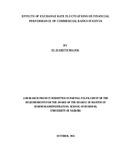| dc.description.abstract | Financial performance refers to the ability to leverage operational and investment
decisions and strategies to achieve a business’ financial stability. It is the measure of a
bank’s achievement of its financial goals guided by its financial objectives and
benchmarks. Exchange rate fluctuations affect domestic prices through three channels;
first is through prices of imported consumption goods, exchange rate fluctuation affects
domestic prices directly, second is through prices of imported intermediate goods,
exchange rate fluctuation affects production cost of domestically produced goods and
third is through prices of domestic goods priced in foreign currency. Foreign exchange
rate fluctuations could be an important source of risk for banking institutions. In the
worst case, large foreign exchange losses could lead to bank failures besides causing
huge burdens on banks’ profitability. The research objective was to determine the effects
of exchange rate fluctuations on financial performance of commercial banks in Kenya.
The study adopted a descriptive research design. The design was more appropriate
because the study sought to build a profile on the effects of exchange rate fluctuations on
financial performance of commercial banks in Kenya. The target population comprised
all 43 commercial banks operating in Kenya as at December 2014. For this study, all the
43 banks were included because the target population was small and the data was easily
accessible from the Central Bank of Kenya. This study used secondary. Secondary data
was collected from the banks’ consolidated financial statements as well as Central Bank
of Kenya offices. The study used Statistical Package for Social Sciences Version 21.0 to
aid in data analysis. The study found that there was a positive relationship between
foreign exchange rate fluctuations and the financial performance of banks as measured by
the returns on assets ratio. The research findings further revealed that the strength of
association between the fluctuations and the returns was a weak one. Results from corelation
analysis revealed that a fluctuation in the value of the domestic currency led to an
effect on the financial performance of the banks. The study revealed that exchange rate
movement also affects the stock market performance greatly especially through its spiral
effects. The study concluded that there is a weak relationship between foreign exchange
rate fluctuations and the performance of commercial banks in Kenya in the study period.
Additionally, the Kenyan shilling exchange rates against the United States Dollar was
observed to be really high during the study period. The study recommended relevant
authorities for instance. The Central Bank of Kenya should adequately put measures to
safeguard the value of the domestic currency. This would ensure that the value on the
same does not fluctuate much day in day out. | en_US |

